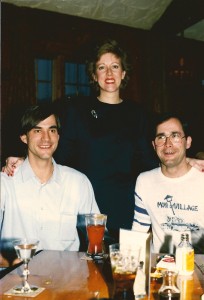April is the Cruelest Month

Angel, Passy Cemetery (photo by Ron Davis)
April is the cruellest month, breeding
Lilacs out of the dead land, mixing
Memory and desire, stirring
Dull roots with spring rain.
T.S. Eliott – The Wasteland
Eliott was right, at least as far as my family is concerned.
On Easter Sunday, April 6, 1996, my brother Bernie went to dinner at the home of family friends. By all accounts he ate well and laughed and left saying he’d see everyone later. Then he went home and hanged himself.
On April 10, 2008, my brother Ronnie got up, had breakfast with his mother, kissed her and went for a walk. They found his body a week later. He’d gone down by the river and hanged himself from a tree on the shore, behind the Anglican Church, where the steep bank would ensure he wouldn’t be seen. He’d taken the rope from our parents’ garage.
Since 1995, getting through April has been pretty rough. This year, the thirteenth anniversary of Bernie’s death and the first anniversary of Ronnie’s, well, let’s just say there’s a bumper crop of lilacs breeding out of the dead land this year, mixing memory and desire.
There have been other suicides this year. Novelist David Foster Wallace hanged himself on September 12. Nick Hughes, son of Ted Hughes and Sylvia Plath, hanged himself on March 16. His mother, of course, famously gassed herself in the kitchen of her north London home in February 1963 while her one-year-old son and his two-year-old sister, Frieda, slept in their cots in a nearby room. She stuffed towels around the kitchen door to make sure the fumes didn’t reach her children. Thanks, Mum.
And there have been others, Thierry de la Villehuchet and William Foxton, both victims of the sociopath Bernie Madoff, killed themselves, as did thousands of other, people who aren’t, even in the rictus of their despair, famous enough to warrant widespread attention.
We tend to think of suicide as something that happens to other people, but it’s far more common than we like to admit. I was talking with a friend the other day, and I told her I couldn’t count the number of people I’ve known over the years who’ve killed themselves. I get past the fingers of both hands and I stop. According to the National Institute for Mental Health, in 2004, suicide was the eleventh leading cause of death in the U.S., accounting for 32,439 deaths. The overall rate was 10.9 suicide deaths per 100,000 people. According to NIMH, an estimated eight to 25 attempted suicides occur per every suicide death.
Expect that figure to jump. According to CNN, the Army reported 24 soldiers committed suicide in January alone — six times as many as killed themselves in January 2008, according to statistics released February 5. I expect the economic situation isn’t going to help either.
Many of the people I know, including both my brothers, have committed suicide as a direct result of alcohol and drug addiction. Mercifully, I’m one of those folks who sit around in church basements, learning how to live without booze or drugs, and thanks to what I’ve learned there, I’ve managed to do without alcohol or ‘dry goods’ for fourteen years. As long as I keep going, I have faith that the quicksand of despair that sucked them under won’t also devour me. But I hear a lot of stories from people in those church basements about their own suicide attempts, including one girl who came out of a blackout to find a cop sitting on the edge of her bed. Apparently, while drinking, she’d called an emergency hot line and said she’d downed a bottle of pills and a couple of bottles of Jack Daniels. She just wanted the pain to stop, she cried. She didn’t remember calling, and didn’t remember taking the pills, but as they wheeled her to the waiting ambulance, the cop took her hand and said, “I’m a recovering alcoholic. I was once where you are now. I promise you, if you get into recovery and stay sober, you’re never going to feel this much pain again.” That was eight years ago. She’s sober and doing great. Not everyone is so lucky.
At my brother’s funeral, my father asked me to give the eulogy, and requested I speak specifically about addiction. I agreed, and afterwards the eulogy was published in the newspaper in my family’s home town, and after that people asked me to put it up on my website, which I did. Even after a year, I still get emails from people reaching out for help. Some check back in later and tell me how it’s going, in those church basements, some I never hear from again. I pray for them all.

Ronnie, Lauren and Bernie in 1989 (Photo by Ron Davis)
Often people look at me with horror when I tell them both my brothers killed themselves. I even had a therapist tell me once that, if I ever approached her for therapy, she’d turn me down. “Since it’s so much more likely you’ll kill yourself, too.” Gee, thanks. Okay, fair enough. The rate of suicide in families of suicide victims is twice as high as normal.[i] In fact, multiple suicides in families aren’t that uncommon. Think of Ernest Hemingway – his father, Ed, sister Ursula, brother Leicester and grand-daughter Margaux all committed suicide. That’s five suicides over three generations. In one study of Amish families, (Egeland & Sussex, 1985) almost three-quarters of 26 suicides bunched in just four families.[ii] Genetics? Maybe. I’m sure that’s part of it, since genetics is also a factor in depression and addiction, but there’s something else – the taboo has been broken. Suicide as a valid solution (albeit a decidedly permanent solution to what may well be a temporary problem) now exists as a real possibility. “Suicide contagion”“has rocked more than one school and Jeffery Eugenides wrote about the family cluster syndrome in his book, The Virgin Suicides. Ross Maracle, a Mohawk elder, has written poignantly about the suicide epidemics among Canadian First Nations children.
So, what does all this mean to us? What does it mean to my family, and to me, and to you, who probably know somebody who’s been affected by suicide? How do those of us who have lost loved ones go on? How do we cope with the grief, the anger, the guilt, the fear and yes, the shame?
I remember being at my father and step-mother’s house after Bernie died in 1995. It was the day after the funeral and my husband, Ron, and I sat on one side of their tidy, sunny, living room, and my father sat on the other side. We were talking about how many people had been in the church, how they’d filled the aisles and the narthex and spilled out into the street. My father looked up, toward the kitchen, and my gaze followed his. There stood my step-mother, her eyes red from crying, her hands pressed up to her mouth.
“Are you okay?” my father asked.
“No,” she managed to squeak out.
My father opened his arms and she ran into them and buried her face in his shoulder and he held her and she held him, and they found comfort and strength with each other.
I thought, they’re going to be all right, if they have that kind of love, the kind that reaches toward each other, that understands where grace and hope live, they’ll be all right. Not unscarred, but all right. And they were. Addiction and depression run like a dark and bloody river through our family, and none of us have been unharmed by it, and none of us have avoided, in turn, harming others, and they might have chosen to blame themselves or each other, but they didn’t.
Not everyone is lucky enough to have that kind of relationship, of course. So you do what you must – find a therapist, a support group, a clergy person, all of the above.
Turning toward the love which was symbolized in my father and step-mother’s embrace meant doing certain things, for love is, after all, a verb, and an active one at that. My father, who had stopped drinking three years before, stayed stopped, and I, who had stopped thirteen months before, stayed stopped, too. And the longer we stayed sober, the more our gaze turned away from selfish things, and we started to repair the damage we’d done, to create more healing in the world than harm.
And then, last year, it happened again. Even though my step-mother spent nearly every waking hour of every day for the past decade trying to save Ronnie’s life, it wasn’t possible. He was so far into his addiction that his body and mind were broken, I believe, beyond repair. So there was another funeral, and more people spilling out onto the church’s lawn, and enormous amounts of kindness and love along with the indescribable anguish, and the wounds that will never fully heal. You learn to limp, and turn toward the light, and your faith, if you haven’t lost it altogether, grows a little deeper, and you look for meaning in the lives of the one’s you’ve lost, and the pain you feel.
When people ask me why I write about these things, I tell them that it’s partly because the pain live inside me every day, as it does in my parents, and as a writer I can’t help but write about those things which obsess me. But also, although I know not everyone commits suicide because of addiction, for an enormous number of people, it’s a huge contributing factor, and I hope that maybe, just maybe, someone who is struggling will read this, and reach out for the help they so desperately need. That is, after all, why my father asked me to deliver Ronnie’s eulogy, in which I told this story:
It was in 1991 and Ronnie had come to visit my husband and me in Toronto. He had nearly a year sober at the time – yes, he did get sober now and again, he just couldn’t stay sober. We had a little bungalow with a big backyard with a hammock and a pool. Ronnie loved to lay out, all that long and lanky length of him, in the hammock and listen to the birds in the trees, and wait for the baby raccoons to come out and play from under the deck where their mother had built a nest. He was working hard to stay sober, and it can’t have been easy for him, since I wasn’t sober yet myself and didn’t hesitate to drink around him, all the while – in that terrible, blind, self-centered way of alcoholics – talking about how great it was he was sober. One afternoon I asked if he wanted to go to an AA or NA meeting. Ronnie said yes, and so off we went into the projects of Toronto, the toughest of the tough neighborhoods. We found the meeting in the community room of a run-down apartment building. It was a good meeting and people were kind and thoughtful and encouraging as Ronnie talked about his commitment to getting and staying sober. Then a man turned to me.
“How you doing?” he said.
“Me? Oh, I’m fine,” I said. “I’m very careful.”
“Keep coming back,” someone said and people laughed.
We came out of the meeting and a gauntlet of drug dealers stood right outside the door.
“What do you want?” they said. “We got what you want.”
That’s the way it is. That’s how hard it can be. Ronnie didn’t manage to stay clean and sober. But a few years later, I walked into my second AA meeting. Even though Ronnie didn’t keep coming back, I did. Sadly, I don’t think Bernie even understood there was a connection between his depression and his drinking.
Addiction robbed both my brothers of everything, and left those of us who loved them in agony. Nevertheless, even though they died, I believe they planted a seed of salvation in me. So that’s why I write about this. I honor my brothers’ memory, and I know that if someone reads this and asks for help because of it, if someone turns from despair to hope, then their lives had meaning.
Although April may be the cruelest month, it is also the month of renewal and rebirth, during which death is overcome and life returns. And here I circle round again to T.S. Eliot, who also said:
So the darkness shall be light, and the stillness the dancing.
Whisper of running streams, and winter lightning.
The wild thyme unseen and the wild strawberry,
The laughter in the garden, echoed ecstasy
Not lost, but requiring, pointing to the agony
Of death and birth.
– T.S. Eliot, Four Quartets, East Corker

The darkness shall be light….. (Photo by Ron Davis)
[i] Runeson B, Asberg M: Family history of suicide among suicide victims. Am J Psychiatry 2003, 160(8):1525-1526
[ii] Comprehensive textbook of suicidology, Ronald W. Maris, Alan Lee Berman, Morton M. Silverman, Bruce. The Guilford Press; (August, 2000)
Amazing article, Lauren. Thanks for posting it. My heart goes
out to you having to endure the deaths of both your brothers.
Your strength and resilience are so inspiring. I am moved and changed just
reading about it.
I do believe that writing about our pain and grief helps so much in
the healing process. Of course we never totally heal but we do
learn to adapt and keep going which is all we can do.
Writing has helped me cope with the senseless death of my baby girl
17 years ago and continues to bring me comfort and connection.
Better than any pill or therapy out there.
Oh, my goodness. Lauren, I feel so inadequate to comment, except to say that this post is a gift. Thanks for telling me about it, and I will link to it on your guest post on ATBA. BTW, how ironic that you should have found my blog in this time of the year, so close to April, which is also (crack a smile here) my birth month.
[…] lost my two brothers to suicide. I think about this. Perhaps one of the most satisfactory answers I’ve found […]
[…] two brothers killed themselves, which I’ve written about elsewhere on this blog, and never once did I feel urged to write about it for consolation. I wrote about it, and will do […]
[…] on Good Friday, 12 years apart. An essay I wrote about their deaths, APRIL IS THE CRUELEST MONTH (https://laurenbdavis.com/blog/?p=43) has been well-published, as has an essay I wrote about my own addiction—WHEN THERE’S NO SKY […]
Hi Lauren. I am so excited for you that your new book is getting great attention. I can’t wait to read it – the subject is fascinating.
I am linked to this article today, as one of my good friends just lost her brother to suicide due to alcohol. I thought this article would help her. Thanks again for writing about this subject.
Take care.
Lise
Oh, Lise — I’m SO sorry to hear about your friend’s brother. Please tell her my prayers are with her.
As for OUR DAILY BREAD — I do hope you’ll like it. It’s good to hear from you, even under these sad circumstances.
As ever I am touched by your searing honesty and boundless compassion!
So privileged to be part of your journey
You’re such a huge part of that journey, Rita!
This is just beautiful, Lauren. And so important. Thank you.
Thanks, Diane. Much appreciated.
Thank you, Lauren.
Thank YOU, Joanne.
Dear Lauren, I’m blown away by this powerful essay. Thanks for being so honest and eloquent. kind regards, Sarah
Thank YOU, Sarah, for taking the time to comment.
Hi Lauren,
Thank you for sharing all this. An eye opener for some. I’ve had two close friends commit suicide this year. This hits home for me. I always say life’s tough but I’m tougher.
Love always,
Denise Erwin
I’m so sorry to hear about your friends Denise. So sorry. Thank you for commenting.
I’m so saddened to hear about your brothers! My thoughts are with you Lauren ❤️
Thank you, Runa. It’s a long time ago now, and I post every year so people in the same position won’t feel alone. The lose remains, of course, but the weight is not as difficult to carry as it once was.